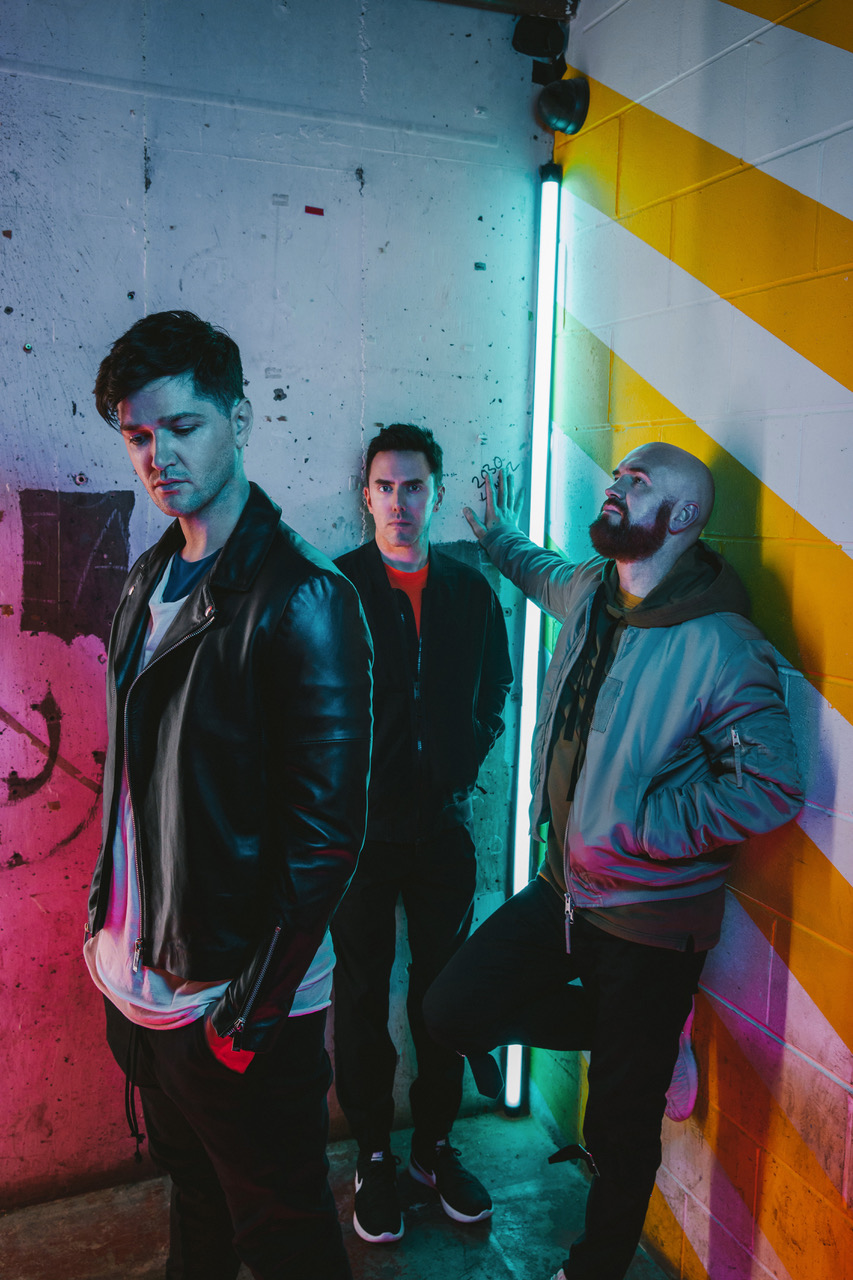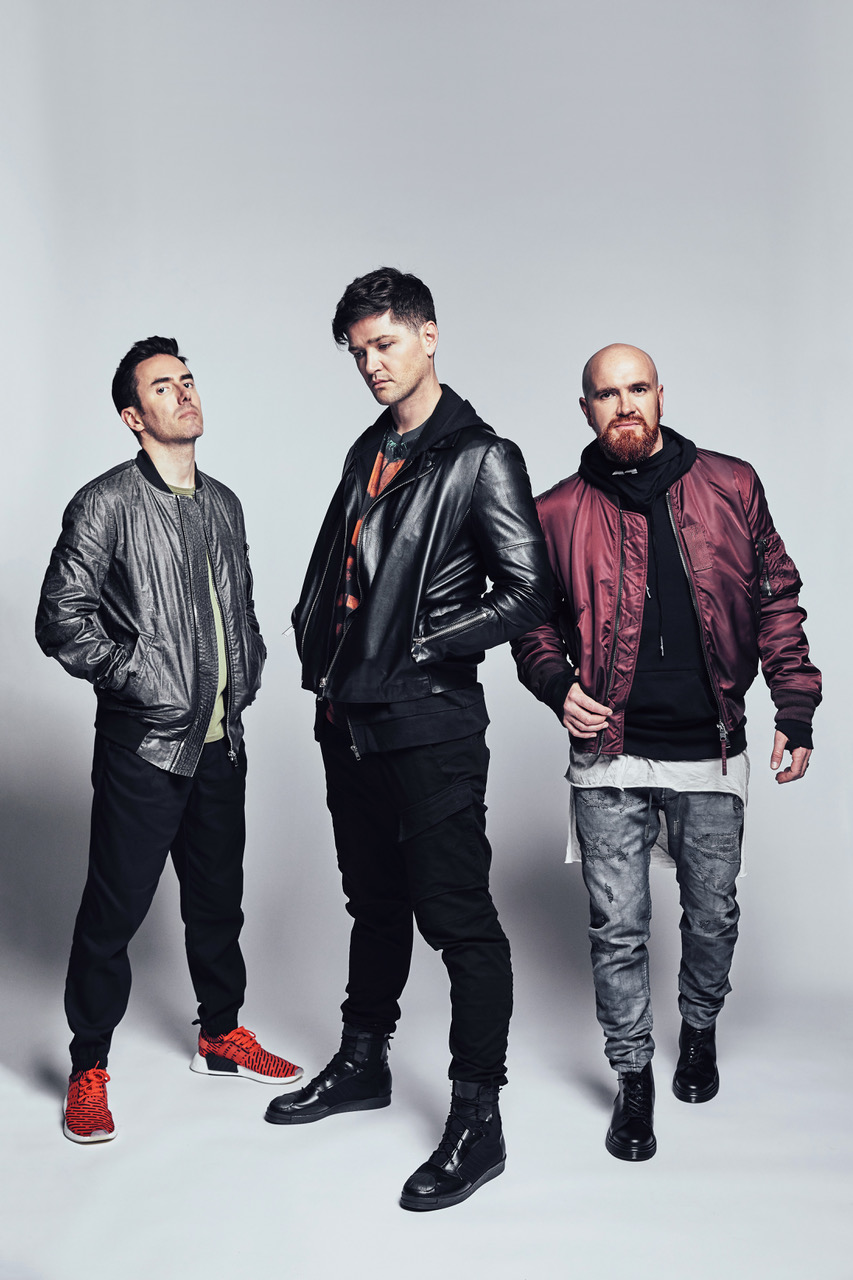Having sold over 30 million records, The Script are one of the world’s most successful bands. The Irish three-piece have three multi-platinum albums, all of which reached #1 in the UK.
Despite this global success; Danny, Mark and Glen demonstrate that rockstar can be cool, calm and collected. Veterans of the industry, here to stay.
It’s been a long time after your last album, what’s behind the name and spirit of your new album ‘Freedom Child’?
Danny: Around the time we were searching for a mantra for the record, Mark’s son came in from school and said ‘what’s terrorism’? I asked him where he’d learnt that word. He’d been doing drills in school in case of an attack. That’s heavy. We just wondered how could you explain terrorism to a child? The way we can do it is through song. To try and write something positive to share. Mark played me the song and it was really strong. We only want to come back out as a band if we have something to say. A hyper-positive message in today’s day. Sometimes people can confuse us as being politically conscious, we’re just trying to be socially conscious of where we are as humans. You can get caught up and mixed up in online and social media but what’s really important? Feelings. Love. Relationships. Tolerance, all of these things are important. Freedom child seemed like the a good working title for us to unite the songs and express the freedom to do whatever we wanted musically.
For the video ‘Arms Open’, You used real footage from the charity ‘A Sense Of Home’, a charity which supports vulnerable youths in the foster care system in the US. Tell us about that?
Danny: For us, this is more than just a music video. Like the song itself, we wanted to reach out to as many people as possible, people who have been less fortunate in life, giving them a platform to tell their stories. On researching the ideas for the video, we came across so many charities, and while they are all doing such great work, we were immediately inspired by A Sense Of Home and wanted to show support and build awareness. This organisation offered a real solution that could be rolled out across the world, particularly in Ireland where this problem is so prevalent. Share it wide and share it proud with arms wide open.
You’ve been away for a while, has anything big changed?
Danny: The whole industry has changed so fast. Digital has changed everything. It’s changed everything for every industry I guess. It’s a matter for us all to pay attention to how best we get our art form across and how it fits and moves in that space. That all changed so much, it was really unusual for us to come back and have taken our eyes off it. Suddenly, we’re releasing a record in this crazy climate. Especially when you are away from the limelight for a little while, just putting the tours on sale you don’t know if the tickets will sell. But then the good news started hitting us that there’s still an appetite for us.
Earlier this year you did some smaller intimate shows, for a band your size that’s very rare. Why did you do those?
Danny: It was more to kind of refresh the fan base. We hadn’t been around in a while and just to restart the album campaign. Instead of coming out and just dropping something, we wanted to do a little tour to get the vibe going again. When you’ve been away for a while, you’re out of sight and out of mind.
Do you miss the smaller venues, do you crave the arena? How does it feel differently?
Danny: It’s higgeldy-piggeldy with us, we’ll go to the states and do a small bar for a radio. Then we’ll go play a show that night, we might go to a giant place in Australia and play a big place then play Brixton’s O2 Academy. You can even play a room to three people. We just felt the last biggest thing we did before the long extended break was Croke Park (80,000 tickets sold out in less than an hour) or Rock in Rio. Both of those are massive gigs, so to go from those to playing the smaller shows is great. We go from small room sessions to huge arenas, we experience the whole range.
Glen: A smaller show can even be more intimidating, people are more close to you. When they’re really on you, it can be more intimidating than the bigger shows. There is an excitement that comes with the bigger shows, when you know you’re about to walk on to that many people it is addictive. There’s something pretty epic about it you know.
It’s a huge thing for a human being to do, is there anything in particular you do just before you go on? Going from a quiet backstage room to that?
Danny: It’s like any walk of life, if you’re a gymnast or a dancer. Across the board if you’re going to do any physical activity that’s in front of an audience you have that element of adrenaline that’s going to settle in. If you haven’t loosened up your muscles a little bit that adrenaline can give you rigour mortis, as a guitarist or singer you don’t want that on song 3. What we all separately do is warm-ups and work outs, usually for about 2 hours or an hour before a show we’ll work out. Boxing, kick boxing work outs, singing warm ups, normally it’s an amalgamation of all those things. Everyone’s just loosening up, you want to hit song 1 warm and ready to go. With that comes a bit of relaxation. Before the big shows we’re running and jumping all over the place, it’s quite physical. For that reason before you go on it’s the best thing to do.

After the show, with all the adrenaline do you find yourself crashing? Do you have to find a way to come down?
All: Oh yeah.
Danny: Usually takes me around 3 hours. Usually when we finish a show we make our way to the buses and say hello to the fans. That’s a good way of dispelling that energy in the body. I just try and talk to loads of people. It calms you down, you get to spend time with the fans that really want to meet you. Calms you down. That’s my way of dealing with it. Spend about 40 minutes to an hour and try to speak to everyone. You will eventually feel the tiredness start to arrive, it takes a while.
Mark: Usually Red wine is my friend, It’s a good old friend. Any other drink boosts you up, like a whiskey or a joint it’s just gonna’ buzz you up. Red wine will mellow you out, send you to the tour bus, send you to bed.
How do you handle the big tours? With your 2018 arena tour coming up?
Glen: One day at a time. I used to look at it and go ‘when am I going to have time’? when will I be home next? I used to torture myself but you’ve got to enjoy what you’re doing. So I just tackle it as it comes. I don’t try to project too much. I used to see 90 gigs I’d say ‘wow, that’s a lot of gigs’. Now I just say, this week, i’ve got 4 shows.
Is that the general pacing of this tour? how do you keep the stamina up?
Glen: It’s usually 4-5 shows a week, with about 1-2 nights off a week. With those nights being spent in a hotel or a bus. You really have to look after yourself. And address things as they come up, get a massage have a bath. Stretch out, basic things like that. People are waiting out there and have spent money on tickets and in some case struggled to get the tickets and had to fight for them. You want to come out there with your guns blazing and be in good shape.
You’ve been in the game a while now, what would you say to a new band that was just starting?
Danny: Maybe they could teach us a few f**king things. Because the industry has changed so much, the advice I’d give to people to people four years ago might be completely irrelevant now. The advice I would give that stands the test of time, be nice to everybody. Be true to you, be true to your own sound. If you’re trying to sound like other people, they’re already them. I’ve told every band and I told all the record executives and press last night; everybody in this room is employed by the songs. Look after the songs. The song is king. The whole industry is paid for by songs. The Adeles, the Michael Jacksons and Bowie. Look after the song, the song will look after you.
What’s in your rider contract?
Mark: It’s got healthier, it used to be a liquid rider. It’s gone healthier because when you’re doing bigger tours, you realise the burnout is going to happen sooner if you don’t stay healthy. We tend to just say to venues ‘look after us’, ‘keep us healthy’. They always put on a nice spread for you. Before we go on stage we have a cheeky whiskey. That’s a nice little equaliser which helps.
Do you have a favourite whiskey?
Mark: I’m a scotch man. I’m an Irish man and the Irish industry might be mad at me, but i’m a scotch drinker.
How do you approach songwriting? Is there a particular environment you create?
Danny: I think often if you start relying on environments and all that stuff, you start tricking your brain into thinking you need those things. Song should be an expression of your environment, it should be embracing your environment. If you’re in California you’re writing a song next to the beach, your song will probably reflect that. I tell young artists all the time it doesn’t cost money to write songs it costs you money to record songs. You should be able to record songs in your bedroom and in your tour bus. Writing songs should be you adapting to your environment. It’s nice to be in a nice studio, but I find we work best sometimes in what looks like a pirate radio station. Studios that we’ve written some of our best songs are kind of small, a bit run down, almost a working class nature to the studio. I find that when we’re not watching the clock, I find we focus a lot more in the music, melodies and lyrics. Every song is different, some come from lyrics or melodies. Let it come when it wants to come. Don’t be afraid and don’t set yourself a formula. That formula will fail you at some point.




